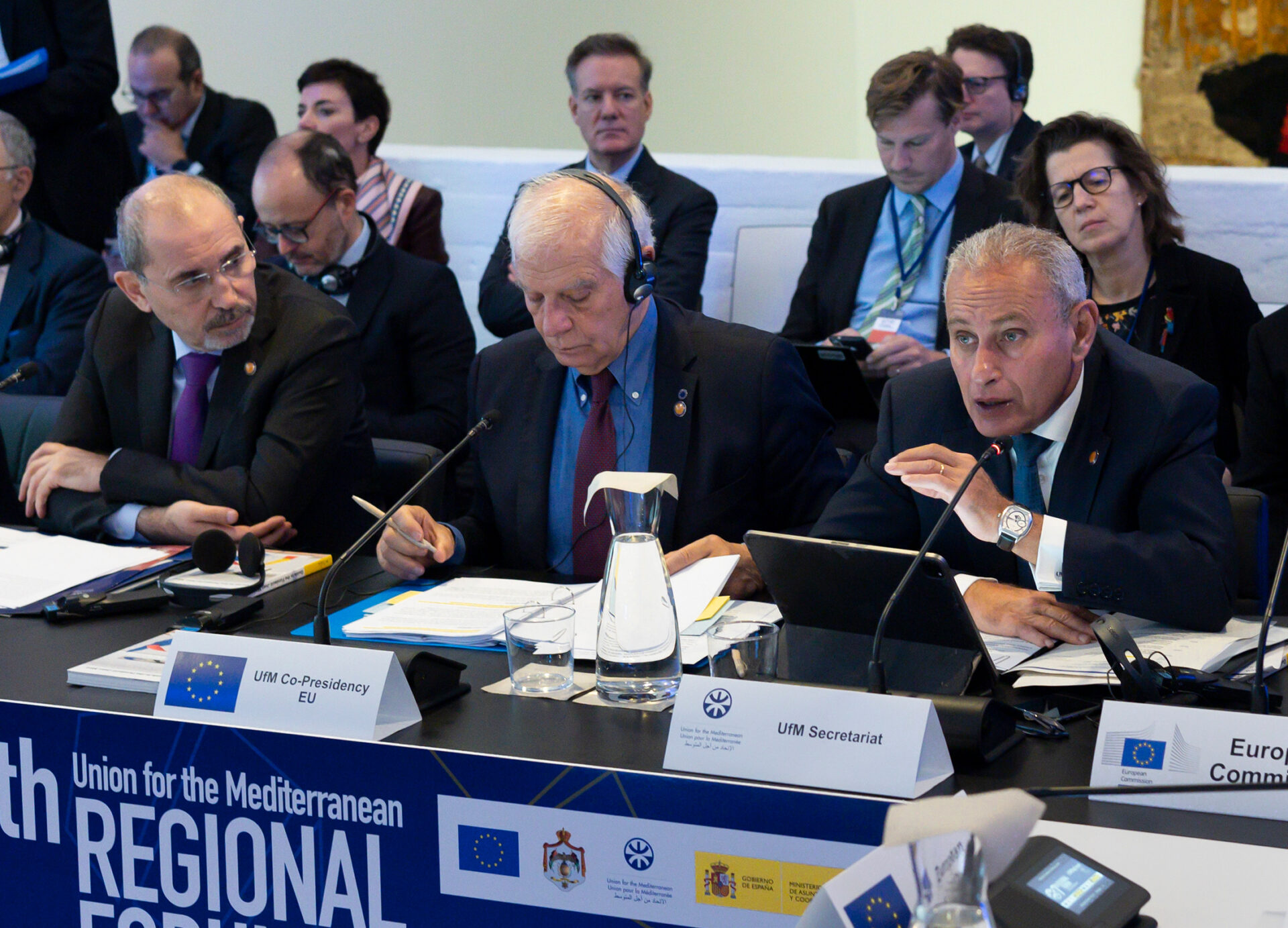Union for the Mediterranean, 15 years of regional cooperation
By Josep Borrell, High Representative for Foreign Affairs and Security Policy of the European Union and Vice-President of the European Commission / Ayman Safadi, Minister of Foreign Affairs and Expatriates, Hashemite Kingdom of Jordan / Nasser Kamel, Secretary General of the Union for the Mediterranean
Published by Hespress (Morocco); Assabah (Tunisia); Al Rai (Jordan); Jordan Times (Jordan); Nidaa al Watan (Lebanon); Al Masry al Youm (Egypt); Independent Arabia (PanArab); Diario de Noticias (Portugal); El Mundo (Spain)
The summer of 2023 marks the 15th anniversary of the Union for the Mediterranean (UfM). Fifteen years ago in Paris, the Heads of State and Government of the European Union and the Southern and Eastern shores of the Mediterranean launched the UfM to give a new impetus to their partnership and to increase the potential for regional integration and cohesion. This occasion allows us to reflect on our collective journey and to reaffirm our common commitment to regional cooperation in the Mediterranean.
A concrete partnership benefiting people, mainly youth and women
Over the years, the UfM has established itself as the leading multilateral framework in the Euro-Mediterranean region despite the challenges posed by a turbulent regional and international context. More than 60 projects have received the unanimous endorsement of the 43 UfM countries. Those projects, with a combined budget of € 5 billion, aim to benefit more than 10 million people directly, with an estimated indirect impact that includes approximately 100 million people. The organisation has championed job creation and women’s rights, enhanced connectivity efforts among countries, and addressed pressing environmental and climate emergencies.
Furthermore, the UfM has prioritised grant schemes and projects to foster entrepreneurship and job opportunities. The Med4Jobs Initiative has helped increase the employability of youth and women. To highlight the cultural richness of the region, the UfM has also launched initiatives to promote diversity, dialogue, and mutual understanding, together with the Anna Lindh Foundation for the Dialogue Between Cultures.
The UfM is actively enhancing higher education systems and focusing on youth-oriented projects. 3000 students will be enrolled in 2024 at the Euromed University of Fès, a pioneer academic institution that educates a new generation with a unique Euro-Mediterranean vision. Recognising the potential of young people as agents for positive change, our Foreign Ministers had a fruitful exchange last November with youth representatives, who highlighted their recommendations and expectations for the future of our shared region. The UfM is also working to accelerate investments in blue economy, which has a huge potential to improve both economic growth and sustainability in the Mediterranean basin.
Common efforts for common challenges and objectives
We need to acknowledge that our efforts thus far have fallen short of target and that challenges persist. Economic integration between the North and the South of the Mediterranean remains largely insufficient. The economic gap between the Northern and Southern shores is widening, with a per capita GDP six times higher in the EU in comparison with its Southern neighbours. Additionally, the COVID-19 pandemic has further deepened social fragmentation and socioeconomic inequality.
The combination of the pandemic, the recent geopolitical shifts, Russia’s war on Ukraine, the protracted regional crises, particularly the stalemate in the Middle East Peace Process and the continued escalation in the occupied Palestinian territories, and the global climate emergency highlight the urgent need for deeper regional integration, particularly in terms of supply chains, clean energy supply and food security.
The Mediterranean region is warming faster than the global average. The region’s fast-growing youth population needs prospects for a life in dignity and prosperity. The consequences are increasingly visible for populations and ecosystems on both sides of the Mediterranean. A coordinated approach at regional level is therefore an imperative to address these challenges effectively.
This is precisely where the strength of our Union – the Union for the Mediterranean – could lie. Our members have varying levels of socio-economic development and diverse interests, but we share common objectives. The UfM’s unique convening power brings together a vast range of stakeholders (academia, civil society, youth, etc) from all the countries of the region. Its experts’ fora, gathering over 8000 stakeholders per year, allow for a rich exchange of ideas and best practices. The UfM’s model of governance, placing North and South on an equal footing, and based on the principle of consensus, can increase co-ownership and inclusivity.
The organisation needs continued commitment from its members to achieve its goal of creating a truly socially, economically and ecologically resilient Mediterranean region. This is why we are working hand in hand with all our members to give it the necessary capacity to deliver more and better, with a greater impact in the region. The immediate future of the region is challenging, but with the UfM we believe we have the right tool to face the future together.

Josep Borrell, High Representative for Foreign Affairs and Security Policy of the European Union and Vice-President of the European Commission.
Ayman Safadi, Minister of Foreign Affairs and Expatriates, Hashemite Kingdom of Jordan
Nasser Kamel, Secretary General of the Union for the Mediterranean
